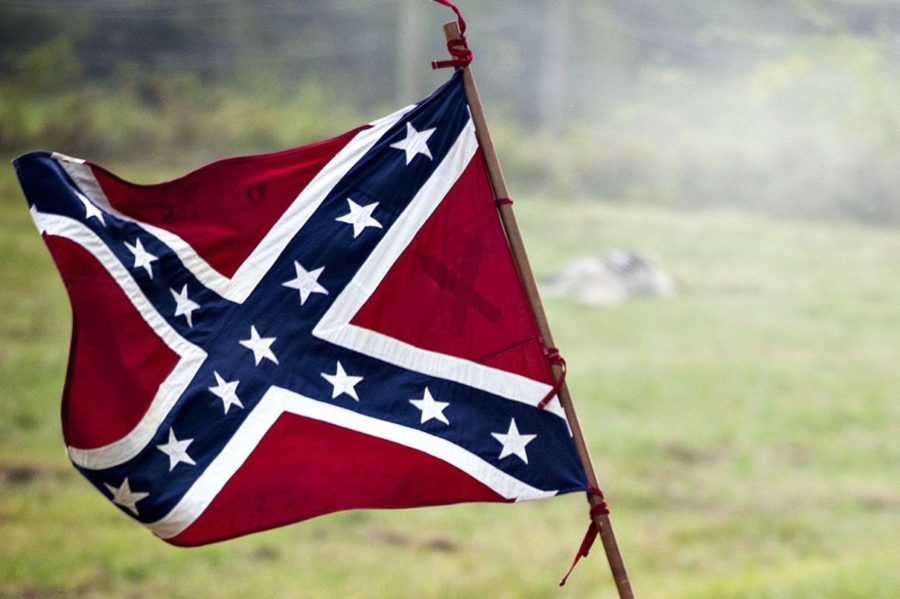Rochford: History of the Confederate flag complex
March 1, 2020
EDITOR’S NOTE: The title of this article was changed, originally published as “The Confederate Flag is a historical symbol,” to more accurately reflect the column and columnist’s opinion. The Daily regrets this error.
At the end of last week, Marine Corps Gen. David Berger circulated an order to begin permanently removing Confederate flags from Marine Corps bases. This includes images and other rebel flag paraphernalia. A congressional hearing concerning the rise of extremism in the military was the catalyst for such an order.
Personally, I have no problem with the order. Contemporary politics aside, this country’s military organizations should not display a flag that represented a rebellion against the United States, a United States that military personnel are sworn to protect.
In a similar vein, in the year 2000, the South Carolina legislature voted to remove the Confederate flag from flying on the capitol dome. Fifteen years later, the state completely removed the flag from the state capitol grounds.
I do not disagree with those removals. The stars and stripes represent the federal government, as they do the governments of the states (along with their state flags).
However, there must be a balance.
Over the past half-decade, there have been rampant and vitriolic arguments over the display of Confederate monuments and symbols across the country. Broadly speaking, the “sides” in the debate take shape as something like “heritage vs. hate” or “history vs. harmony.”
The debate can be extremely complex in several ways. Even here in Iowa, one might see the Confederate flag flying on a truck, on a garage or on a bumper sticker.
I have seen the stickers for “heritage not hate” a few times over the past couple years here in the Yankeeland. Perhaps those people are of Southern origin or their families are, but there are plenty that use the symbol that are not.
So what does that mean? Do people that possess the flag or fly it represent the country’s worst? Generally, I do not think so, although certainly there are uses of both the Confederate and American flags (and other symbols like the sickle and hammer and swastika) that have historically and in small numbers, contemporarily, represented racism, hatred and violence.
Many people that I know or know of who fly the Confederate flag fly it out of historical ignorance. I do not use the word “ignorance” as disparaging, but literally. For those people, flying the flag often simply represents “rebel.”
Not enough words are allotted for me, but suffice it to say that slavery sparked the American Civil War. One cannot get away from that fact. The preservation of slavery is why the Confederacy existed, but it is not why every individual fought for the Confederacy (indeed, the Confederate government instituted the first military draft in American history due to the need for manpower).
Flying or possessing Confederate symbols as an individual does not necessarily make a person a racist or a bigot. However, if one does fly the flag, you must understand that the complex good, bad and ugly that has been associated with it over the past more than 150 years applies still. The “rebel” interpretation does not exist in a historically independent vacuum.
Completely destroying or removing the Confederate flag or other symbol-like monuments does us no good either. Last July, officials cancelled the annual Civil War days in Lake County, Illinois, over concerns relating to the Confederate flag.
A local activist claimed on social media, “That reenactment was culturally insensitive and had no place in Lake County. The reenactment was just glorifying the white man. It’s whitewashing history to glorify the white man.” In the many attempts to remove, destroy or ban Confederate symbols, the pendulum cannot swing so radically far. We need to be able to continue to learn and create interest in our history so that we can understand.
How can we learn if we destroy and ban?
I have two books in the backseat of my car that have the Confederate flag as the primary cover design. One is a Civil War memoir of a South Carolinian, and one is a collection of primary sources relating to Pickett’s Charge. I study the Civil War, but if one saw those books without context, what would the assumption be?
In the debate over the Confederate flag, both sides need to strike a realistic balance and understand the interwoven complexities.

















